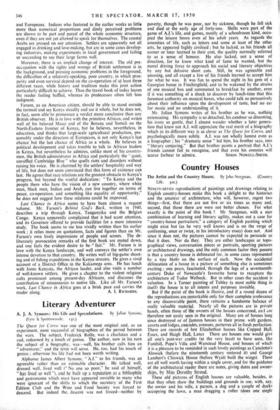Literary Adventurer
A. J. A. Symons: His Life and Speculations. By Julian Symons.
(Eyre & Spottiswoode. i is.) The Quest for Corvo was one of the most original and, as an experiment, most successful of biographies of the period between the wars. The subject, Frederick Rolfe, was a charlatan and a cad, redeemed by a touch of genius. The author, now in his turn the subject of a biography, was—well, his brother calls him an " adventurer," and the term will serve. He, too, had his touch of genius ; otherwise his life had not been worth writing.
Alphonse James Albert Symons, " A.J." to his friends, was an agreeable rather than an estimable character. He talked well, dressed well, lived well (" No one so poor," he said of himself, "has lived so well "), and he built up a reputation as a bibliophile and gastronome which must have appeared enviable to many who were ignorant of the shifts to which the secretary of the First Edition Club and the Wine and Food Society was forced to descend. But indeed the. descent was not forced—neither by poverty, though he was poor, nor by sickness, though he fell sick and died at the early age of forty-one. Shifts were part of the game of A.J.'s life, and games, mostly of a schoolroom kind, occu- pied the leisure hours even of his adult years. As regards the amenities of life, such as letters and some at least of the other arts, he appeared highly civilised ; but he lacked, as his friends all sooner or later learned to their cost, the quality normally referred to as a sense of honour. He also lacked, not a sense of direction, for he knew what kind of fame he wanted, but the moral driving force to approach his social and literary objectives by any but delusive short cuts. Still, he was agreeable and amusing, and all except a few of his friends learned to accept him for what he was. It was fun to spend the night in his gem of a Georgian house in Finchingfield, and to be wakened by the strains of one musical box and summoned to breakfast by another, even if it was something of a shock td discover by lunch-time that this foremost authority on musical boxes, who could talk so persuasively about their influence upon the development of taste, had no ear for music and no understanding of it.
Mr. Julian Symons writes of his brother as he was, nothing extenuating. His sympathy is so detached, his candour so disarming, his irony so gentle, that I almost wonder whether a later genera- tion that knew not A.J. will appreciate the real merit of a biography which in its different way is as clever as The Quest for Corvo, and psychologically more subtle. A.J. was not wholly honest even as a biographer ; his " dramatic sense " led him, his brother says, into " literary conjuring." But that brother paints a portrait that A.J.'s friends cannot fail, to recognise, and that even his enemies will


































 Previous page
Previous page